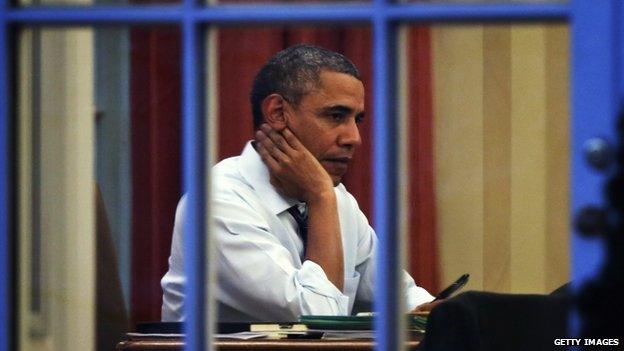2014 State of the Union
- Published
- comments

President Obama's "year of action" seems to involve going it alone.
The president will make the economy the mainstay of his annual address to Congress and the country. And it will appear to be a deliberate message to a divided Congress, who oppose some of his signature measures such as raising the minimum wage.
The White House says that the president will call on Congress to raise the minimum wage for federal workers to $10.10 per hour from $7.25 and also link future rises to inflation.
But, knowing Republican opposition, he will in a sense bypass Congress and issue an executive order that new federal contracts and those being renegotiated will see that rise in the minimum wage from next year, benefitting janitors and low-paid workers.
Obama might also issue executive orders on job training and retirement measures.
Unequal
This is far from ideal, but without Congressional support, the president has limited powers and raising the minimum pay for some federal workers is at least some action that will reduce a bit of the income inequality that is a key focus for the president.
I have written before about how the top 1% in the US have captured 95% of the incomes gained since the recovery.
That inequality is seen behind the patchy and slow improvement in growth.
An issue as daunting as addressing inequality isn't going to be resolved through a few actions by the president. It requires the lawmaking body, the Congress, to act.
Inactive
For a president who has failed to get backing for his either his healthcare plan, an infrastructure bank that he has been calling for for four years, or a $75bn plan on early childhood education he proposed in last year's State of the Union, any action he takes will, he hopes, be seen as making some impact and - importantly - distancing himself from the inactive Congress.
After all, public opinion polls are less than favourable over the government shutdown antics.
As the mid-term Congressional elections loom, Obama's "year of action" will be showcased for those key elections and for his own legacy.
For the economy, though, piecemeal, go-it-alone policies are unlikely to be as effective in addressing the big questions, such as why the US economy hasn't rebounded as it has from previous recessions and whether the gains that have been had are accruing to the few.
UPDATE 03:40 GMT
The speech is over and the president proposed a series of pragmatic, small policies that he exhorted Congress to act upon, or he will by executive action. The most notable of which, as expected, was to raise the minimum wage. To support his case he evoked how women dominated low-wage jobs and how it was "wrong" that women still earn 23% less than men.
He also proposed something called MyRA, which is a new savings bond for workers to build up a retirement fund. Obama said it would guarantee a "decent return" with workers at no risk of losing what they put in. It was the most significant policy next to raising the minimum wage.
Throughout the speech, the theme was clear. Will Congress "help or hinder" what Obama calls America's "breakthrough year"? He cited all the ways in which the economy was improving, such as record corporate profits and the move towards energy security. He emphasised that the role of the state was important, but said the full faith and credit of the US should not be risked - a not so oblique reference to the unpopular fiscal impasse.
He proposed policies on issues such as to:
close tax loopholes and encourage in-sourcing of jobs back to America
support small businesses, especially as 98% of exporters are small firms
immigration reform to grow the economy and shrink the budget deficit by almost $1 trillion in next 20 years
reform training programmes for workers
restore unemployment insurance that just expired for 1.6 million people
cap student loan payments to 10% of income
A prime example of where Obama will act because Congress won't is to fund a pre-Kindergarten programme, so he plans to pull together a coalition of elected officials, business leaders and philanthropists to do it.
Another big theme in the speech was inequality, which hits at the heart of the American Dream. Obama emphasised how average wages have barely budged, inequality deepened and upward mobility has stalled. His first big applause and standing ovation came when he said that the daughter of a factory worker was chief executive of America's largest automaker, the son of a barkeeper was Speaker of the House, and the son of a single mum can be President.
When she ran against him, Hilary Clinton cited former New York governor Cuomo who observed that you campaign in poetry but govern in prose. The rhetorical Obama is now governing in prose with his almost workman-like practical proposals. Even then, he will hope that some will bear fruit before the crucial mid-term elections, which could define the political make-up of Congress for the remainder of Obama's term and his probable legacy.